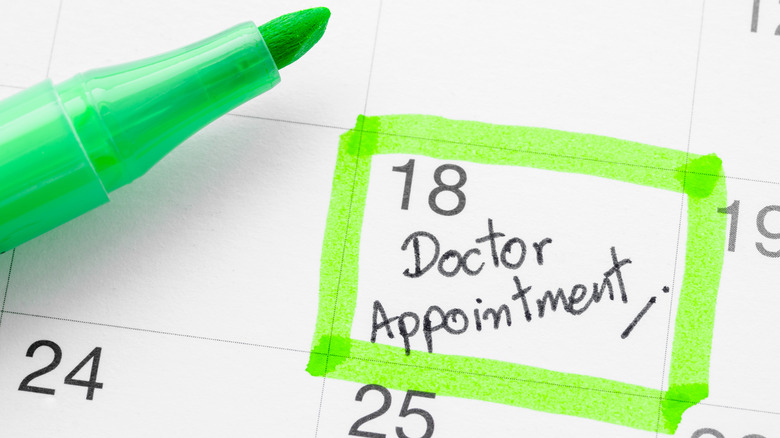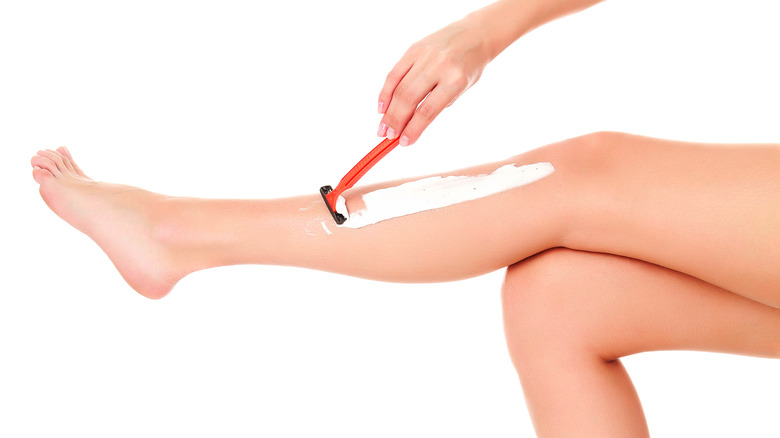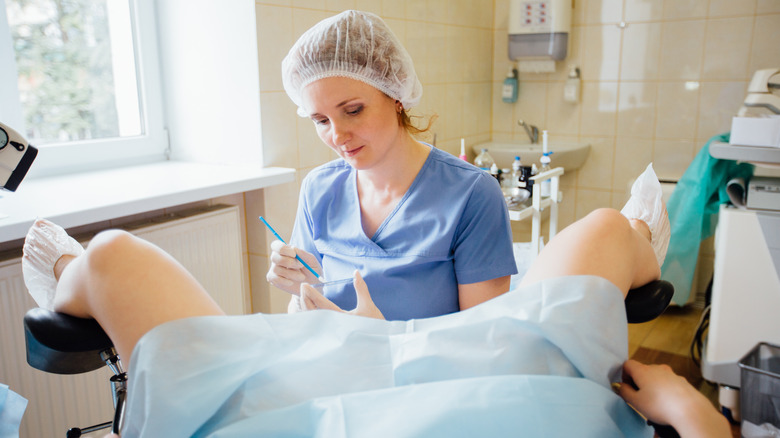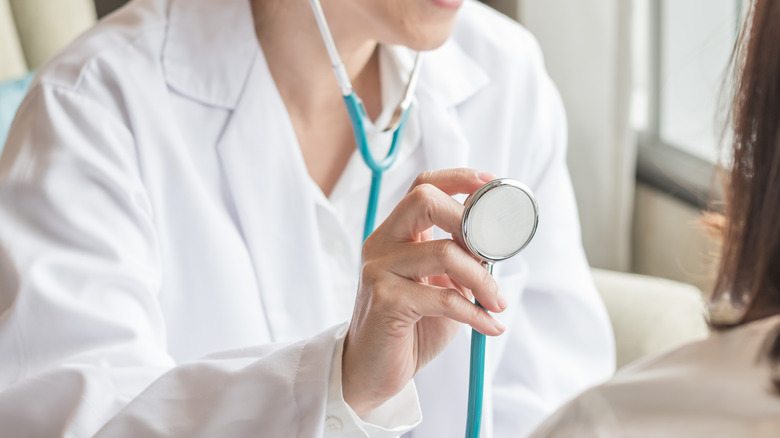Questions Your Gyno Wants You To Ask
As an OB/GYN, I am accustomed to asking my patients many questions during their health visit, and often these are deeply private questions about their health, their sexuality, their stress levels and medical and surgical history. While these questions seem invasive, it's all in the name of providing top care to women. But, it seems only fair that patients get to fire questions at me sometimes. Here, I've compiled a list of the most common questions I receive as a gynecologist. Hopefully, I've hit on some questions you've thought of asking, but we're unsure if you should.
Do you really get your well appointments done, too?
Totally! I do. If you have to do it, then I have to do it. I'm not all talk and no action! I'm a busy mom and a working mother, so I like to get mine done during my birth month. It's my trick so I can remember when it's time for everything (so many women can't remember their last period, let alone when their last well woman exam was). So every March, I book my well woman, mammogram, etc. so that I can keep track of when I've done my last one. Remember, insurance plans usually will only cover a well each full year, so if you had your exam last year on March 15, the earliest you can get your next one is March 16. For my working ladies, I recommend doing a whole day of wellness (and I always recommend a deliciously awesome "treat" lunch as a reward, for me, preferably with cheese). Think of it as a day of health that keeps giving back to you all year!
What's the weirdest thing you've ever removed from someone?
Someone once asked me this question during a routine exam, and I thought it was one of the best inquiries I've ever heard! I have removed retained tampons (once I removed two!), pieces of condoms, even a part of a vibrator from someone's vagina. Why do I even entertain this question? It's not to gross anyone out! It is a pertinent question to women's health because it helps women know they are not a freak if it happens to them. It happens. It's a cavernous area, and unless you're really up to par on your yoga flexibility, it's hard to reach in your own vagina! I usually have at least one patient a month from whom I remove an object that shouldn't be there. I hope talking about these perceived "embarrassments" during an exam reassures any woman that stuff happens, and sometimes it happens in your vagina.
How often do I need to see you?
This a great question, and one that is confusing! Every year. But what we do each year may vary. I always say, some of the difficulty of women's health is so many of our parts are inside, where we can't (easily) check them out ourselves. Young women should start having well-woman exams around age 13-14, but pap smears (looking for cervical cancer) are recommended starting at age 21. I generally discuss health prevention with this young women, including birth control, safe sex, vaccinations and other general preventive health issues.
The American Congress for OB/GYN recommends that women see their provider annually after 40 for breast cancer and other cancer screening. In women 21-39, the Congress recommends an exam every 1-3 years. For many women, their gyno is their only doctor, so seeing me yearly (even though I know you dread it) can prevent serious problems in the future.
Do you care what I look like down there?
Good gracious, no! I'm not just saying that, either. So many women apologize for the state of their shaven legs, their perceived "unclean" nether region or their lack of updated pedicure. If you choose to go "natural", doctors don't care! Frankly, I am just thrilled you are taking control of your health status, and honestly, I'm too busy taking care of hundreds of women to even remember what your business looks like from year to year! But no matter how many times I tell my patients that I don't care about the state of their "business", every year there's still some apology by a woman about her own appearance. Stop apologizing, ladies! Please don't ever delay an exam because you feel you're not primped enough. You are owning your healthcare!
What are you going to do to me at my annual appointment (yikes!)?
I always tell my patients that the gynecology visit is still better than the dentist: I let you talk during the exam and I don't use drills. (I have an ongoing disagreement about this point with my friend, who's a dentist). Your annual visit should include cancer and sexually transmitted infection screening, evaluation and counseling on birth control, hormone replacement therapy, and immunizations based on your age and risk factors.
I will always perform a physical examination (which does require you to disrobe) to ensure you are in top form. In general, the physical examination will include obtaining standard vital signs, determining body mass index, checking your abdomen and inguinal lymph nodes (by the groin), and making an assessment of your overall health. Many, but not all, women will have a pelvic examination and a clinical breast examination as a part of the physical examination. Labwork is also fairly standard to check for thyroid disorders, cholesterol and overall general health.
What are you thinking about during my exam?
I'm generally going through my head about what kind of labs and exams you need at your age. Do you have any additional risk factors based on your family history, such as breast or ovarian cancer? I'm thinking about whether we need to discuss quitting smoking again, or if we need to (gently) discuss your weight. What kind of birth control might you want to discuss and which would be appropriate options for you? Does that ovary feel normal, or enlarged? I must ascertain your entire health status and do it quickly. Of course, I try to remember thoughtful details a la Bridget Jones about your life —your kids names, etc. I promise I'm not making a shopping list or thinking about what else I have to do that day. I am focused solely on you!
What should I ask you during a well woman exam?
Ask away! I love focused questions. I always ask that patients be mindful of other patients, and not bring up 13 years of infertility at their well woman, which will hold up the rest of the clinic day. If I don't mention something (I generally jabber the whole time about what I recommend, but some doctors are more reserved), then bring it up. I promise we can at least start the conversation. As I mentioned previously, there are certain health checks we do at certain ages, so if you're not sure what those are, please inquire. Birth control, HPV vaccine, pre-pregnancy concerns, lab work — these are all fair questions. I once had a woman at the end of her well woman ask me why she's never had an orgasm — she was 70 years old! I applaud her for having the guts to bring it up. Ask the question. And then let's start the healing!
How do I know what birth control is best for me?
Objectively, birth control is one of the most revolutionary advances in medicine. Twenty years ago, we had only a few choices for birth control. Today, there are literally hundreds of different kinds of birth control pills. Injections, patches and implants round out your choices as well. Medicine now offers implants that stay in your inner arm for three years, intrauterine devices that last anywhere from three to ten years, diaphragms, etc. In fact, there are so many choices that I often touch on all of these and then give you time to think about what works best with your life schedule and desires. Do you want hormones? Do you not? If you are not in a monogamous relationship, I also always recommend condom use to every woman of every age. I always say that pregnancy is the cutest sexually transmitted disease! Do your research, ask friends what they use. Check what is covered by your insurance. And if you don't like what you picked, together we can pick something else.
How can I get the most out of my time with you?
Show up 15 minutes early, fill out any required paperwork and have your appointment visualized in your mind. Always bring your identification and insurance card, if you have one. Be prepared to leave a urine specimen. Have your pharmacy information ready and always know your last menstrual period.
What items do you want to discuss? Bring these to the attention of my nurse, so I can be assured I hear about it in case you forget during your exam. I may also need to prepare separate labs or book another appointment to discuss more issues. It's ok to be nervous and not really want to be at your appointment (no one really likes going to the gyno, I get that!). Go with the flow and the appointment will be over before you know it.
Why do you do what you do?
This question is usually followed by the requisite: how can you look at vajayjay all day long? Obstetrician–gynecologists have a long tradition of providing preventive care to women. Why do gynos want to be asked this question? For one, I am a woman, and I get these exams, too. I understand what it's like feeling naked and vulnerable at an appointment. Secondly, I enjoy providing preventive care to women. I take care of girls at the start of their womanhood all the way to the more mature years. Women are complex and dynamic and I love taking care of them. Yes, I do see a lot of vaginas. And breasts. But I also am a witness to a woman's life — through new relationships, surprises, heart break and even, sadly, death. It's an honor to see women every year and catch up like old friends.
No judgment here!
I don't believe in judging women for not having kept up with their healthcare. I do emphasize it's importance, though, and it's never to late to start! Taking control of your health is crucial. With healthcare in the U.S. so uncertain these days, an ounce of prevention really is worth a pound of cure. And please, ask your gyno questions — no matter how embarrassing. He or she is happy to oblige!











